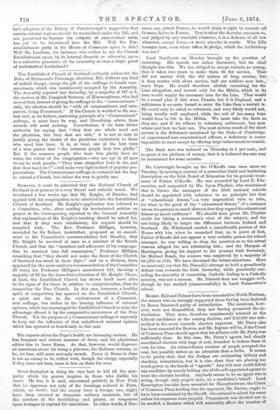The Established Church of Scotland evidently wishes for the Duke
of Richmond's Patronage Abolition Bill, without any kind of radical change, except the gift of the suffrage to female com- municants, which was unanimously accepted by the Assembly. The Assembly rejected last Saturday, by a majority of 187 to 8, the motion of Mr. Campbell Swinton, of Kimmerghame, who had moved that, instead of giving the suffrage to the " communicants " only, the election should be " with all communicants and rate- payers, being Protestants." If the Church is wedded to the nar- row and, as we believe, narrowing principle of a " Communicant" suffrage, it must have its way, and liberalising advice from outside will avail nothing. Nevertheless, if we have divine authority for saying that "they that are whole need not the physician, but they that are sick," it is not so easy to justify giving the choice of the physician exclusively to those who need him least. It is, at least, one of the beat tests of a true pastor that " the common people hear him gladly." But if the common people who hear him gladly have no votes, the rulers of the congregation—who are apt in all ages to say to such people, " Thou west altogether born in sin, and dolt thou teach us ?"—will make very light indeed of popular pre- possessions. The Communicant suffrage is certainly not the way to extend a Church, but rather the way to petrify one.


































 Previous page
Previous page